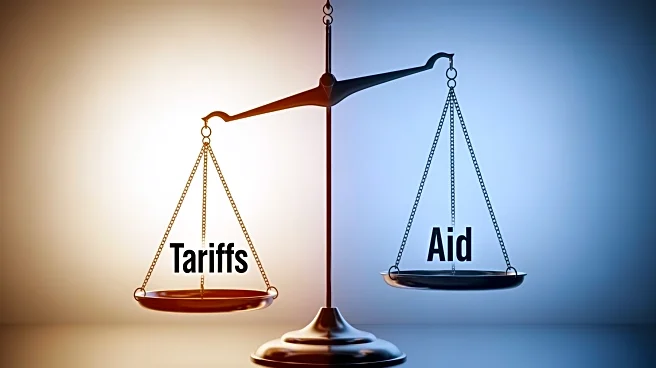What's Happening?
Treasury Secretary Scott Bessent has expressed strong opposition to an anti-tariff television advertisement aired by Ontario's government, labeling it as 'psy-ops' or psychological operations against U.S.
citizens. The ad, which features former President Ronald Reagan criticizing tariffs, has led President Trump to announce an additional 10% tariff on Canada. Trump has also accused the ad of being a 'misrepresentation of the facts' and a 'hostile act.' Meanwhile, Bessent defended the U.S. decision to extend a $20 billion currency swap line to Argentina, arguing that it aligns with the 'America First' policy by supporting a U.S. ally. Despite criticism from figures like Rep. Marjorie Taylor Greene, Bessent emphasized that the aid is not a bailout and will not result in taxpayer losses, as it is funded through the Treasury Department's Exchange Stabilization Fund.
Why It's Important?
The developments highlight ongoing tensions in U.S.-Canada trade relations, exacerbated by the controversial ad and subsequent tariff threats. The situation underscores the complexities of international trade policies under the Trump administration, which often prioritizes aggressive tariff strategies. The aid to Argentina reflects a strategic move to stabilize a key ally in Latin America, potentially preventing the rise of another 'failed state' in the region. This approach could influence U.S. relations with other Latin American countries, as it demonstrates a preference for economic intervention over military action. The outcome of these policies could have significant implications for U.S. economic and geopolitical interests, particularly in maintaining influence in the Western Hemisphere.
What's Next?
The Supreme Court is set to hear arguments on November 5 regarding President Trump's authority to impose tariffs under the International Emergency Economic Powers Act. The decision could have far-reaching consequences for the administration's trade policy. Additionally, the economic situation in Argentina remains precarious, with expectations of a potential devaluation of the peso following the country's midterm elections. The U.S. will need to monitor the situation closely to ensure the stability of its financial support and to assess the broader impact on regional stability.








